What is Perimenopause?
Perimenopause refers to the transitional phase leading up to menopause, the point in a woman’s life when she stops menstruating permanently. This phase can begin several years before menopause, typically occurring in a woman’s 40s, but it can start as early as the 30s.
What is Perimenopause?
During perimenopause, the ovaries gradually begin to produce less estrogen, which is the primary female sex hormone. The duration of perimenopause varies but typically lasts from 4 to 8 years, culminating in menopause once a woman has gone 12 consecutive months without a menstrual period. The onset and progression of perimenopause can differ significantly among women, making it a uniquely personal experience. Coping with its symptoms often involves lifestyle adjustments, hormone therapy, and other treatments tailored to individual needs and symptoms.


Are you affected?
Menopause is a natural biological process that marks the end of a woman's reproductive years, typically occurring between the ages of 45 and 55. Understanding whether you are entering or experiencing menopause can help you manage its symptoms more effectively. If you're experiencing several of the symptoms, you may be entering menopause. It's important to consult with a healthcare provider who can provide guidance and treatment options tailored to your specific symptoms. Managing menopause effectively can greatly improve your quality of life during this natural transition.
Causes
Natural Decline in Reproductive Hormones
As women age, their ovaries produce less estrogen and progesterone—hormones that regulate menstruation—and their fertility declines. Eventually, the ovaries stop releasing eggs altogether, leading to the cessation of menstruation and the onset of menopause.
Ovary Removal (Oophorectomy)
Surgical removal of the ovaries, which produce hormones like estrogen and progesterone, immediately induces menopause. This is because the body no longer produces these hormones at levels necessary to maintain the menstrual cycle.
Chemotherapy and Radiation Therapy
Cancer treatments can induce menopause, occurring abruptly or prematurely. While chemotherapy attacks rapidly dividing cancer cells, it can also affect the functioning of the ovaries. Radiation treatments directed near the pelvic area can similarly affect ovarian function.
Primary Ovarian Insufficiency
About 1% of women experience menopause before the age of 40 (premature menopause). This condition, known as primary ovarian insufficiency, is characterized by the underperformance of the ovaries and the inadequate production of reproductive hormones. It can be caused by genetic factors or autoimmune diseases but often occurs without a known reason.
Chronic Diseases
Certain chronic conditions like tuberculosis and autoimmune diseases like rheumatoid arthritis or systemic lupus erythematosus can also precipitate earlier menopause. The transition into menopause can vary widely among women. Understanding the causes and effects of this transition can help manage the symptoms more effectively and prepare for changes in the body that accompany this stage of life.
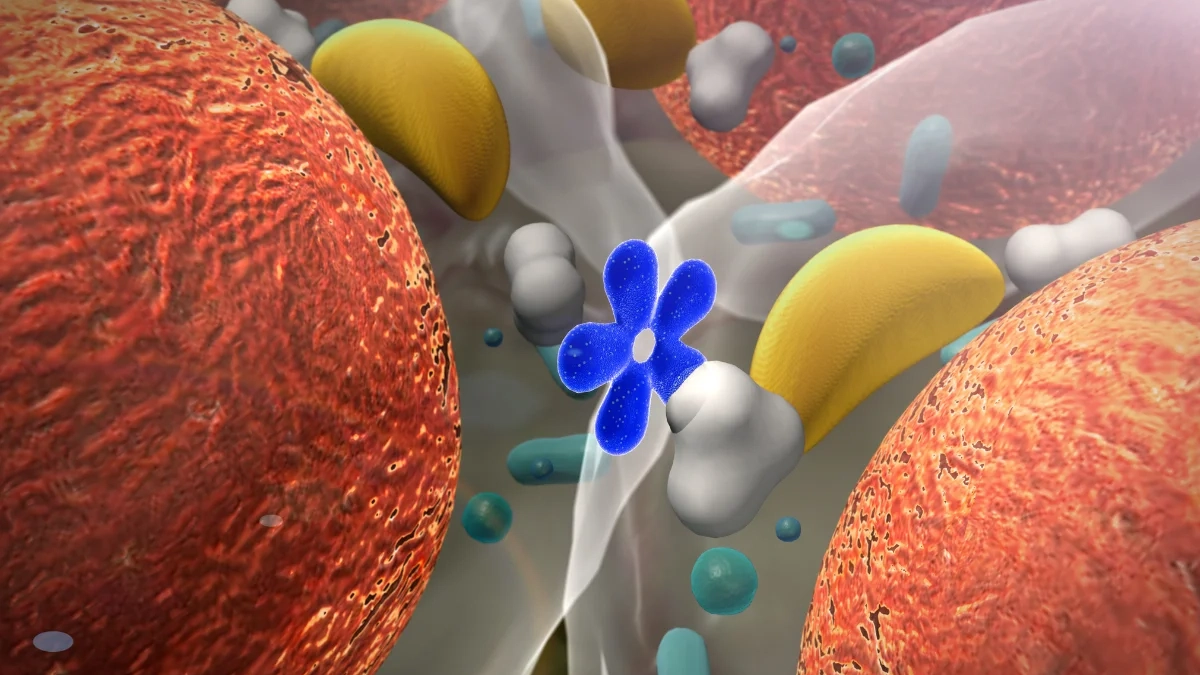
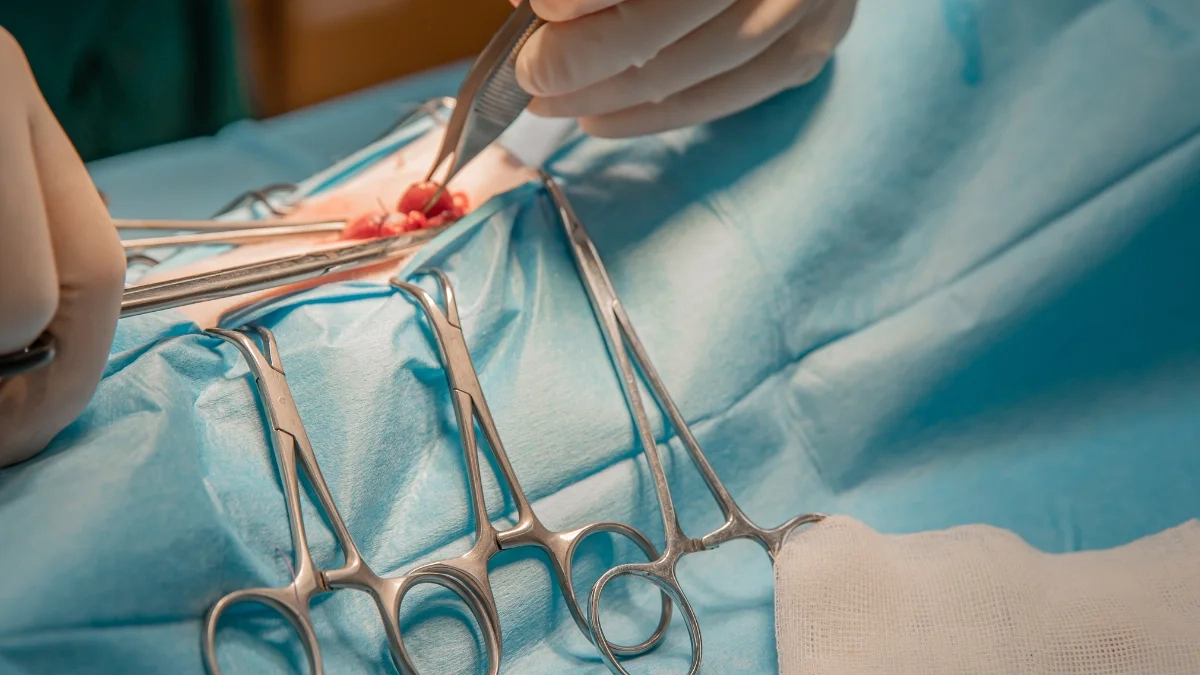
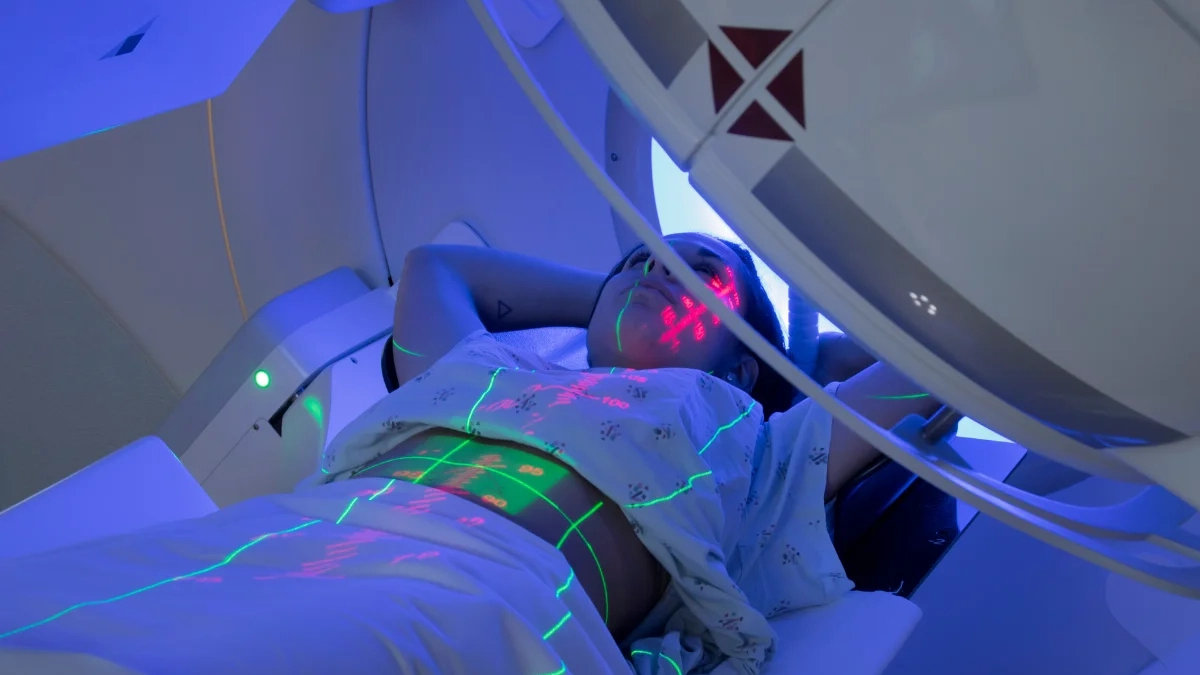
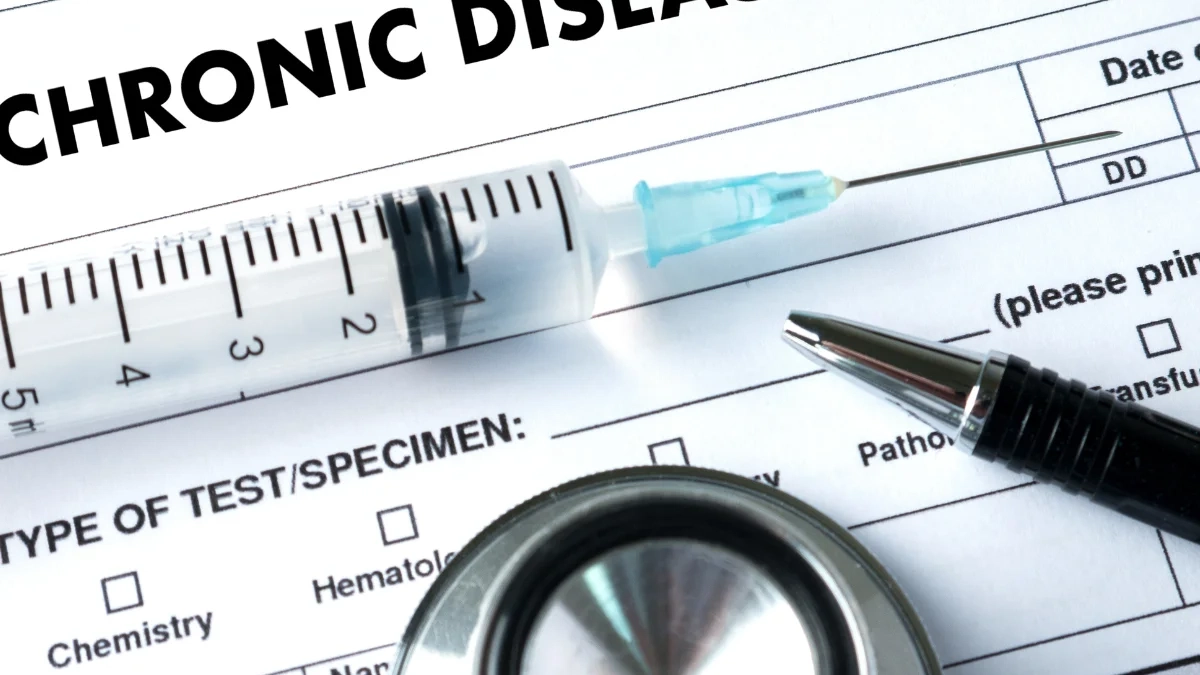
Identifying Characteristics of Perimenopause
- Irregular Menstrual Cycles: As estrogen levels fluctuate, menstrual cycles can become longer, shorter, or irregular, and periods may be lighter or heavier than usual.
- Menopause Symptoms: Women may begin to experience symptoms commonly associated with menopause, such as hot flashes, night sweats, mood swings, sleep disturbances, and vaginal dryness.
- Changes in Fertility: While fertility decreases during perimenopause due to less frequent ovulation, it is still possible to become pregnant until menopause is reached.
- Irregular Periods: One of the earliest signs of menopause is changes in menstrual cycle regularity. Your periods may become irregular, lighter, heavier, or more sporadic before stopping entirely.
- Hot Flashes: A very common symptom, hot flashes are sudden feelings of warmth, usually most intense over the face, neck, and chest, which can cause blushing and sweating.
- Night Sweats and Sleep Problems: Many women experience night sweats and may have trouble sleeping well, often due to hot flashes or insomnia.
- Mood Changes: Hormonal changes during menopause can lead to increased feelings of irritability, anxiety, or depression.
- Vaginal Dryness: Decreased estrogen levels can lead to vaginal dryness, which may cause discomfort during intercourse.
- Thinning Hair and Dry Skin: Lower hormone levels may result in thinner hair and drier skin as collagen decreases.
- Loss of Breast Fullness: Hormonal changes may cause the breasts to lose their fullness and firmness.
Frequently Asked Questions
What is pre-menopause?
Pre-menopause refers to the period in a woman’s life before the onset of menopause. It includes the years when her body begins to make gradual changes towards menopause, primarily characterized by changes in menstrual cycle regularity and the initial appearance of menopausal symptoms.
How can I tell if I’m in pre-menopause?
Signs that you might be entering pre-menopause include irregular periods, changes in menstrual flow, hot flashes, night sweats, mood swings, and changes in libido. If you notice these changes, it might be an indication that you are transitioning towards menopause.
What can I do to alleviate symptoms of pre-menopause?
Lifestyle adjustments such as maintaining a balanced diet, regular exercise, adequate sleep, and stress management can help manage symptoms. Additionally, hormone replacement therapy (HRT) and other medications can be effective in alleviating symptoms but should be discussed with a healthcare provider.
Are there any non-hormonal treatments available for pre-menopause symptoms?
Yes, there are several non-hormonal treatments that can help manage symptoms, including herbal supplements like black cohosh, phytoestrogens, and vitamin E. Cognitive-behavioral therapy and other forms of counseling might also help manage mood swings and emotional changes.
How long does pre-menopause last?
The duration of pre-menopause varies for each woman but typically lasts from a few months to several years. Most women enter menopause around the age of 51, but pre-menopause can start in the 40s or even earlier.
Can I still get pregnant during pre-menopause?
Yes, pregnancy is still possible during pre-menopause as ovulation may still occur, though less regularly. If pregnancy is not desired, continue using contraception until you’ve had one year without a menstrual period.
What are the best dietary changes to support health during pre-menopause?
Incorporating a diet rich in calcium and vitamin D is crucial to support bone health as estrogen levels decline. Foods rich in antioxidants and omega-3 fatty acids can also help manage inflammation and support overall health.
How can I improve my sleep during pre-menopause?
Establishing a regular sleep schedule, creating a comfortable sleep environment, and avoiding stimulants like caffeine and electronic devices before bedtime can improve sleep quality. Consider relaxation techniques such as meditation, yoga, or deep breathing exercises to help manage sleep disturbances.
What should I discuss with my healthcare provider regarding pre-menopause?
Discuss all symptoms, treatment options, and their benefits and risks. It’s also important to talk about your overall health, how pre-menopause may impact existing health conditions, and any preventive measures you should take during this transition.
Is it normal to feel anxious or depressed during pre-menopause?
Yes, hormonal changes can impact your mood, contributing to feelings of anxiety and depression. It’s important to discuss these feelings with your healthcare provider, as effective treatments are available to help manage these symptoms.

Perimenopause Myths
Myth: Pre-menopause symptoms are the same for every woman.
The experience of pre-menopause can vary significantly from woman to woman. Some may experience severe symptoms, while others may have mild or no noticeable changes. The type and intensity of symptoms are influenced by various factors including genetics, lifestyle, and overall health.
Myth: You can’t get pregnant during pre-menopause.
While fertility declines during pre-menopause due to less frequent ovulation, it is still possible to conceive. Women should continue using contraception until reaching full menopause, defined as one full year without a menstrual period.
Myth: Pre-menopause only affects older women.
Though most women begin experiencing pre-menopausal changes in their 40s, it can start earlier. Factors such as genetics, surgery, or certain health conditions can induce early pre-menopause, sometimes as early as the mid-30s.
Myth: Hormone replacement therapy (HRT) is necessary for managing pre-menopause.
HRT can be an effective treatment for managing symptoms in some women but is not necessary for everyone. Non-hormonal treatments, lifestyle changes, and alternative therapies can also significantly alleviate symptoms.
Myth: Pre-menopause symptoms are merely physical.
The hormonal fluctuations during pre-menopause can also affect emotional and mental health. Many women experience mood swings, anxiety, and depression during this transition phase.
Myth: If your mother had a difficult pre-menopause, you will too.
While genetics play a role in menopause, each woman’s experience is unique. Lifestyle factors such as diet, exercise, and stress management also significantly influence the severity of symptoms.
Myth: Pre-menopause marks the beginning of a rapid health decline.
Many women remain vibrant, healthy, and active well into post-menopause. Adopting a healthy lifestyle during pre-menopause can help manage symptoms and maintain health and vitality.
Myth: There’s nothing you can do to ease pre-menopause symptoms except wait it out.
There are many strategies to manage pre-menopause symptoms effectively. These include dietary adjustments, regular exercise, stress reduction techniques, and medical treatments tailored to individual needs.
How Can We Help?
Microneedling involves using a device equipped with fine needles to create tiny punctures in the top layer of the skin. This controlled skin injury triggers the body's natural wound healing processes, stimulating collagen and elastin production.
Microneedling is a highly effective rejuvenation treatment that can be particularly beneficial for women experiencing pre-menopausal skin changes. As estrogen levels begin to fluctuate and decline during pre-menopause, many women notice changes in their skin’s texture, elasticity, and overall appearance. Microneedling, also known as collagen induction therapy, can address these concerns by promoting the skin’s natural healing processes and enhancing its overall quality and appearance.
Benefits of Microneedling for Pre-Menopause Skin Rejuvenation:
Improves Skin Texture and Firmness: As collagen production increases, the skin regains its firmness and elasticity, reducing the appearance of fine lines and wrinkles that may start to appear during pre-menopause.
Enhances Skin Hydration: By improving the skin’s barrier function, microneedling can help retain moisture more effectively, addressing the dryness that often accompanies hormonal changes in pre-menopause.
Reduces Hyperpigmentation: Hormonal fluctuations can lead to uneven skin tone and dark spots, commonly seen during pre-menopause. Microneedling helps in dispersing pigment granules in the skin, thus evening out skin tone and reducing hyperpigmentation.
Increases Product Efficacy: The micro-channels created by microneedling allow for better absorption of topical treatments, making skincare products more effective. This is particularly beneficial for pre-menopausal women using targeted treatments like anti-aging serums or creams.
Minimally Invasive with Minimal Downtime: Unlike more invasive procedures, microneedling offers a minimally invasive solution with minimal downtime, making it an appealing option for busy individuals.
Promotes a Radiant Complexion: Regular microneedling sessions can improve overall skin appearance, resulting in a smoother, more radiant complexion that enhances one’s natural beauty without the need for extensive cosmetic treatments.
Considerations:
While microneedling is a safe procedure for most skin types, it’s important for women in pre-menopause to consult with a dermatologist or skincare specialist who understands the nuances of hormonal impacts on the skin. A professional can tailor treatments to your specific skin type and concerns, ensuring both safety and effectiveness.
In summary, microneedling offers a promising solution for women seeking to rejuvenate their skin during the pre-menopausal phase. It addresses various skin concerns by harnessing the body’s own regenerative capabilities, leading to visibly younger, healthier skin.
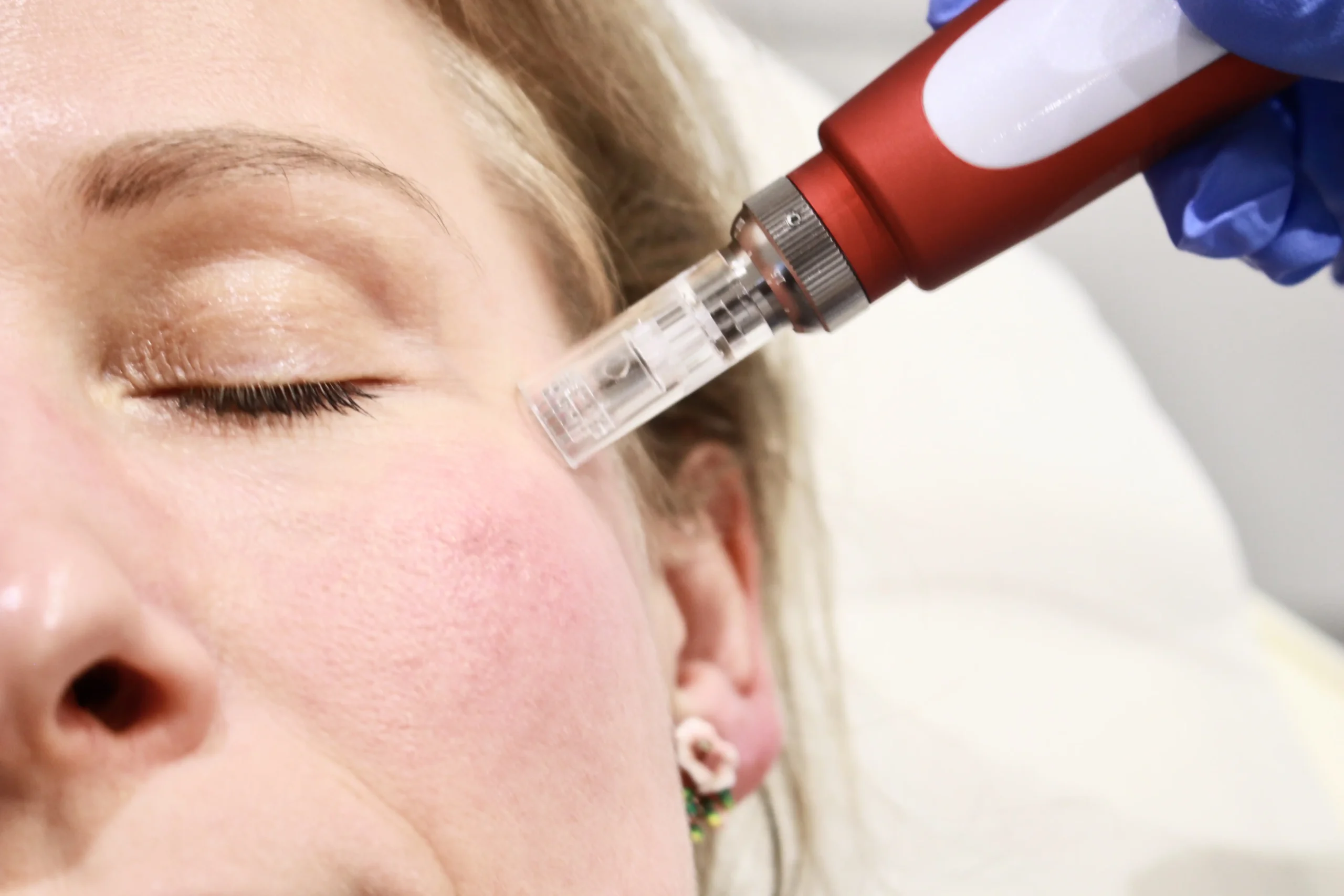
Treatment Time
60 Minutes
Visible Results
Immediate
Full Recovery
Not Avaliable
Duration
Not Avaliable
Sensitivity Time
None
Anaesthetic
None
Back to Work
Immediate
No. of Treatments
Not Avaliable
Exilis treatment involves using a device that delivers radiofrequency energy to the skin. This energy heats the deeper layers of the skin, stimulating collagen production and causing the skin tissue to contract. This not only improves skin elasticity but also helps tighten and firm the skin’s appearance.
Exilis is a highly effective rejuvenation treatment that can be particularly beneficial for women experiencing pre-menopausal skin changes. As estrogen levels begin to fluctuate and decline during pre-menopause, many women notice changes in their skin’s texture, elasticity, and overall appearance. Exilis, which uses radiofrequency technology to heat the deeper layers of the skin, can address these concerns by promoting the skin’s natural collagen production and enhancing its overall quality and appearance.
Benefits of Exilis for Pre-Menopause Skin Rejuvenation:
Improves Skin Tightness and Elasticity: As the skin’s collagen levels are boosted, it becomes firmer and more elastic, reducing the appearance of fine lines and wrinkles that may start to appear during pre-menopause.
Enhances Skin Contouring: Exilis can effectively contour the face and neck by tightening the skin, offering a non-surgical solution to sagging skin that can occur with hormonal changes.
Reduces Appearance of Wrinkles: The tightening effect of Exilis also smooths out wrinkles and lines, rejuvenating the facial appearance without the need for invasive procedures.
Non-Invasive with No Downtime: Exilis is a non-invasive treatment with no downtime, making it an excellent option for those with busy lifestyles who are seeking effective anti-aging solutions.
Provides Progressive Improvements: Results from Exilis improve over time, with optimal results typically seen after a series of treatment sessions. This progressive improvement allows for a natural transition to younger-looking skin.
Considerations:
While Exilis is safe for most skin types, it’s crucial for women in pre-menopause to consult with a dermatologist or skincare specialist who understands the hormonal impacts on the skin. A professional can tailor treatments to your specific needs and concerns, ensuring both safety and effectiveness.
In summary, Exilis offers a promising solution for women looking to rejuvenate their skin during the pre-menopausal phase. It tackles various skin concerns by enhancing the body’s collagen production, leading to visibly tighter, firmer, and more youthful skin.
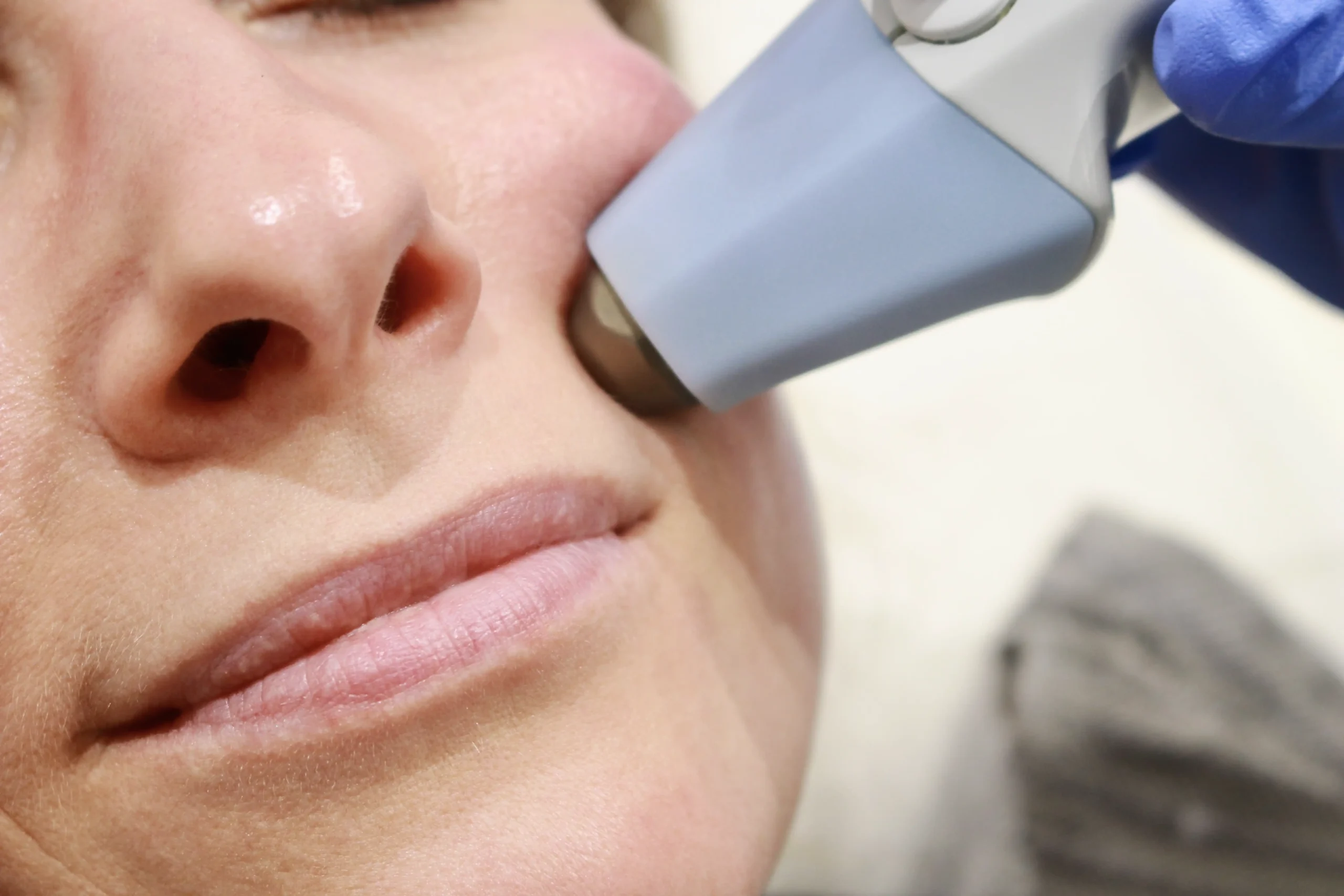
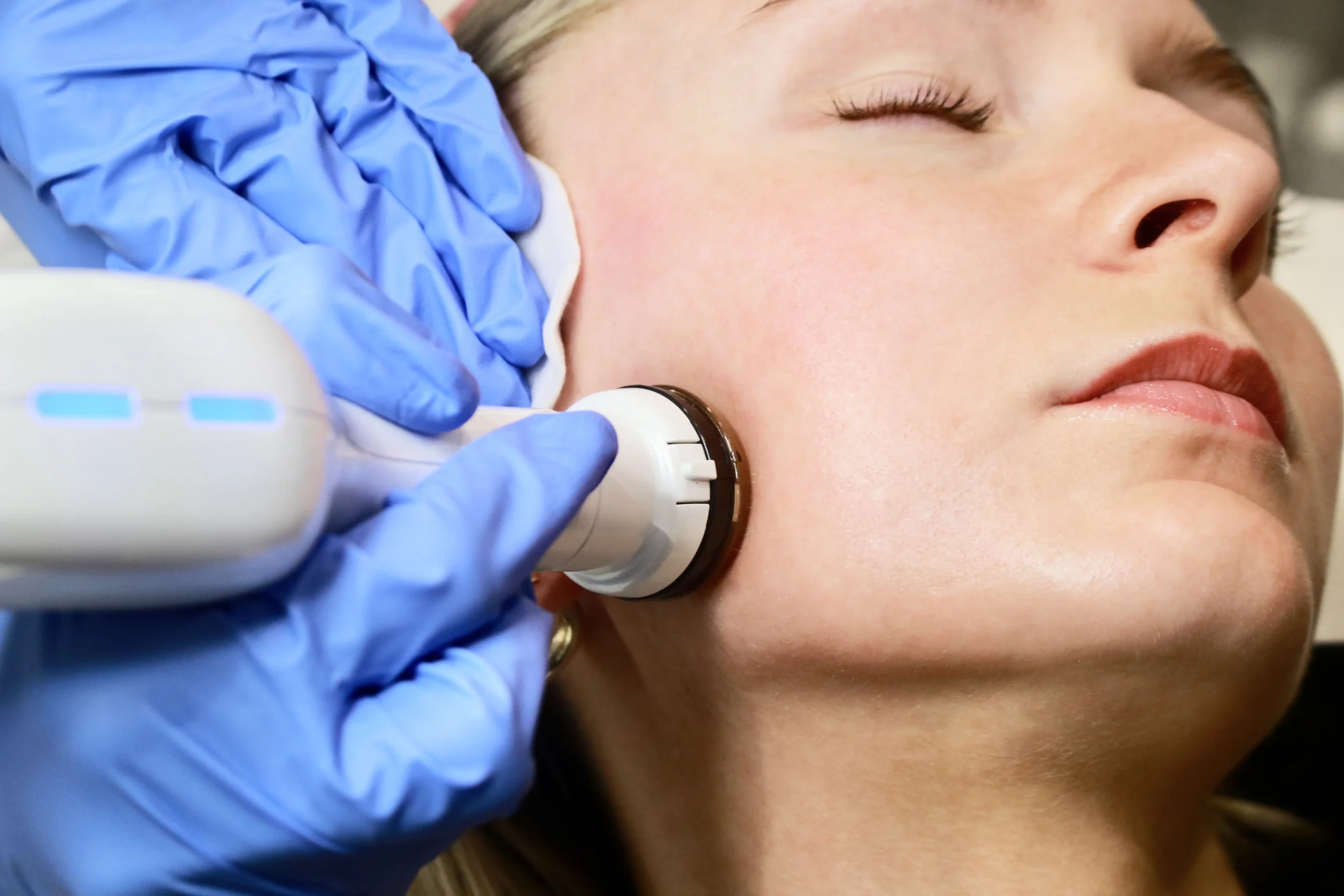
Treatment Time
60 Minutes
Visible Results
Immediate
Full Recovery
Immediate
Duration
Treatment Plan
Sensitivity Time
24 Hours
Anaesthetic
Not Avaliable
Back to Work
Immediate
No. of Treatments
Weekly
High-Intensity Focused Ultrasound (HIFU) is an innovative, non-invasive treatment that has been adapted at FTT Skin Clinics to address skin concerns associated with perimenopause. During perimenopause, women often experience changes in skin elasticity and firmness due to hormonal fluctuations.
HIFU targets the deep structural layers of the skin, including the SMAS layer (Superficial Muscular Aponeurotic System), which is typically targeted in surgical facelifts. The ultrasound energy penetrates deeply without harming the surface of the skin, stimulating the body’s natural healing response and encouraging the production of new collagen.
The primary benefit of HIFU in treating perimenopausal skin concerns is its ability to significantly boost collagen production. Collagen is crucial for skin elasticity and firmness, both of which can decline during perimenopause. By stimulating collagen synthesis, HIFU helps to tighten loose skin and reduce the appearance of wrinkles and sagging that may intensify during this hormonal transition.
HIFU is entirely non-invasive, requiring no cuts, injections, or anesthesia, making it a suitable option for those looking for effective results without surgery. Treatments are relatively quick, generally taking about 30 to 90 minutes depending on the area treated, and there is no downtime, allowing patients to return to their normal activities immediately.
The results of HIFU are progressive and long-lasting. While some initial effects can be seen immediately, the full benefits are typically visible within 2-3 months as the collagen regeneration process continues to improve the skin’s texture and firmness. The results can last for several years, depending on the individual’s skin condition and aging process.
HIFU at FTT Skin Clinics is often part of a comprehensive approach to facial rejuvenation during perimenopause. It can be combined with other treatments such as hormone replacement therapy, nutritional advice, and topical skin care products to manage other perimenopausal symptoms effectively.
HIFU is known for its safety and efficacy, with a proven track record in facial and neck rejuvenation. The treatment itself is typically well tolerated, with most patients experiencing only a slight discomfort due to the heat generated by the ultrasound energy.
By addressing the skin laxity and loss of firmness associated with hormonal changes during perimenopause, HIFU provides a powerful solution for women looking to maintain a youthful appearance without undergoing invasive procedures. At FTT Skin Clinics, HIFU is customized to each patient’s specific needs to ensure optimal results and satisfaction.

Treatment Time
60 Minutes
Visible Results
Immediate
Full Recovery
Immediate
Duration
Treatment Plan
Sensitivity Time
24 Hours
Anaesthetic
Not Avaliable
Back to Work
Immediate
No. of Treatments
Weekly
Each facial is customized based on a thorough skin analysis conducted by professional aestheticians at FTT Skin Clinics.
Perimenopause can bring about significant changes in the skin due to hormonal fluctuations, such as decreased collagen production, dryness, and loss of elasticity. Targeted treatment facials at FTT Skin Clinics are designed to address these specific skin concerns by providing intensive care tailored to rejuvenate and restore the skin’s health during perimenopause.
This personalized approach ensures that the facial treatments directly address perimenopausal symptoms like increased dryness, sensitivity, and fine lines. Ingredients and products used during the facial are selected to meet the unique hormonal and aging skin needs of each client.
Hydration is crucial for aging skin, especially during perimenopause when the skin tends to become drier and less resilient. Targeted treatment facials incorporate deeply hydrating serums, masks, and moisturizers enriched with hyaluronic acid, ceramides, and essential fatty acids to restore moisture levels and improve the skin’s barrier function.
To combat the loss of firmness and elasticity, these facials often include elements that stimulate collagen production, such as peptides, retinoids, or vitamin C. Techniques like microdermabrasion or mild chemical peels may also be used to remove dead skin layers and trigger the skin’s natural regeneration processes, leading to a firmer and plumper skin appearance.
Antioxidants are vital in fighting the free radical damage that can accelerate during perimenopause due to increased oxidative stress. Facials might incorporate potent antioxidants like vitamin E, ferulic acid, and green tea extract, which help protect the skin from environmental damage and improve its overall radiance and health.
Perimenopausal skin can also become more reactive and sensitive. Targeted treatment facials often include soothing and anti-inflammatory components such as aloe vera, chamomile, or niacinamide, which help calm the skin and reduce redness and irritation.
Beyond immediate treatment, these facials are part of a broader skincare strategy developed at FTT Skin Clinics. Clients are often provided with a home care regimen that complements the facial treatments, ensuring continued skin care that addresses perimenopausal changes effectively.
To maintain and enhance the results, regular facials are recommended. Consistent treatments help to continually support skin health during perimenopause, adapting to changes in the skin’s needs as hormonal levels fluctuate.
A key part of the treatment experience at FTT Skin Clinics includes professional guidance and support. Aestheticians discuss lifestyle and dietary factors that can impact skin health, offering holistic advice that complements the clinical treatments.
Targeted treatment facials at FTT Skin Clinics are an excellent way for women going through perimenopause to manage the skin changes associated with this transitional phase. By addressing specific symptoms and providing tailored care, these facials help restore skin vitality and youthfulness, making them a valuable part of managing perimenopausal symptoms.

Treatment Time
60 Minutes
Visible Results
Immediate
Full Recovery
Immediate
Duration
Treatment Plan
Sensitivity Time
24 Hours
Anaesthetic
Not Avaliable
Back to Work
Immediate
No. of Treatments
Weekly
At Home Care Tips
At FTT Skin Clinics, we empower you with practical tips to manage pre-menopause and enhance the effectiveness of your skincare efforts. For those enduring the psychological impact of pre-menopause, seeking support and adopting a positive skincare mindset are essential steps towards healing both skin and self-esteem.
Navigating the skin changes during pre-menopause can be challenging, but with the right at-home care strategies, you can maintain healthy, vibrant skin. Here are some practical tips to help manage the common skin concerns associated with pre-menopause
Moisturize Regularly: Hormonal changes can lead to drier skin. Use a rich moisturizer to keep your skin hydrated and enhance its barrier function, which is crucial for maintaining skin health and appearance.
Sun Protection: Sun damage can exacerbate aging signs and contribute to uneven skin tone. Apply a broad-spectrum sunscreen daily to protect your skin from harmful UV rays, which are potent accelerators of premature aging.
Gentle Cleansing: Choose a gentle cleanser that doesn’t strip your skin of its natural oils, which can become more scarce during pre-menopause. Avoiding harsh soaps and cleansers will help maintain your skin’s natural balance.
Antioxidant-Rich Diet: Eating a diet rich in antioxidants can help combat the signs of aging from the inside out. Foods high in vitamins C and E, such as berries, nuts, and green leafy vegetables, can support skin health and reduce the impact of oxidative stress.
Stay Hydrated: Drinking plenty of water is essential for maintaining skin hydration and elasticity. Aim for at least 8-10 glasses a day to help keep your skin plump and reduce the appearance of fine lines.
Regular Exercise: Engaging in regular physical activity can improve circulation, which helps to nourish skin cells and keep them vital. Exercise also helps reduce stress, which can have a negative impact on your skin.
Enhancing Your Routine with PreMeno Glow Tretinoin
To further enhance your skincare routine, consider incorporating PreMeno Glow Tretinoin into your regimen. Tretinoin is a potent derivative of vitamin A, renowned for its ability to accelerate cell turnover, improve skin texture, and reduce the appearance of fine lines and uneven skin tone. It’s particularly effective during pre-menopause, as it combats the slowdown in cell renewal and increases collagen production, helping to counteract the effects of hormonal changes on the skin.
Using PreMeno Glow Tretinoin can provide targeted treatment to rejuvenate pre-menopausal skin, making it an excellent addition to your nightly skincare routine. Regular use can lead to significant improvements in skin tone and texture, giving your skin a healthier and more youthful appearance. As with any potent skincare product, it’s important to start slowly and follow usage guidelines to ensure the best results and minimize potential irritation.
